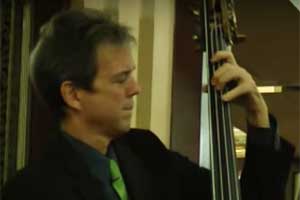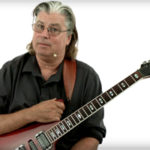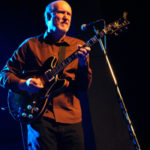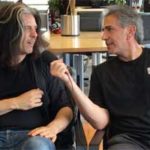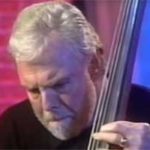Jazz bassist talks about his jaw-dropping career
By David Sands
September 2, 2015
Top photo: Koko Sugiyama
It’s not unusual for young musicians with an inclination for jazz to wonder what it might be like to share the stage with some of the genre’s all time greats.
The cool thing about Jon Burr is he’s actually done that, touring and recording over the years with the likes of Stan Getz, Buddy Rich, Chet Baker, Horace Silver and Art Farmer. Through his hard work, the talented bassist has distinguished himself as a heavy hitter in the jazz world, not just as a sideman, but as a composer, teacher and bandleader too.
In addition to having led several ensembles throughout his career, he’s also arranged music for his own big band, which first performed in 2013. As for albums, Burr has released several, including Just Can’t Wait, a recording of original songs, and 3 for All, a collaboration that features Bucky Pizzarelli and Sir Roland Hanna.
With Jonathan Russell and Howard Alden, the bass player also recorded a tribute album to Stéphane Grappelli, the legendary late French violinist whom he played with in the Eighties and Nineties. As if that’s not enough, he was also a founding member of Mark O’Connor’s Hot Swing Trio and has shared the stage with artists like Tony Bennett, Eartha Kitt and Rita Moreno.
It’s been an extraordinary career by anyone’s accounting. FBPO’s Jon Liebman recently had the privilege of speaking with him about it in an interview that explored his musical upbringing, a remarkable encounter with Charles Mingus, his online arrangement work and more.
The household in Long Island where Burr grew up in the Fifties and Sixties was no stranger to music. His father knew his way around the accordion and piano, and he had brothers who played guitar and trombone.
The bass player’s childhood friend John Marshall, who eventually wound up as a trumpeter in Germany’s WDR Big Band, also had the musical spark. In fact, Burr’s first experience listening to Charles Mingus was at Marshall’s house around fifth or sixth grade, and it was transformative.
“He played me a Charlie Mingus record,” Burr tells FBPO. “I remember the opening statement to ‘Haitian Fight Song:’ Doo-doo, doo, doo! That changed my life, those four notes.”
After that the sound of the bass had a magnetic draw for him, and Mingus served as enduring inspiration.
The bass player also credits his high school music teacher, Clem DeRosa, with being a profound early influence. Before he became a pioneering jazz educator, DeRosa had been a house drummer at the legendary jazz venue Birdland.
Not surprisingly, DeRosa had extensive contacts in the jazz community, and had a habit of bringing his musician friends to Burr’s school for performances.
In particular, he recalls a visit by jazz pianist Marian McPartland’s group. Linc Milliman was her bass player at the time, and Burr remembers taking a “psychic snapshot” of his performance, as his style was so different from other players he’d encountered. In 1969, while enrolled in a summer program at the Berklee College of Music, he again ran into McPartland who was teaching a three-week jazz workshop. This time, her bass player was Michael Moore, who ended up being an important mentor to the fledgling bassist.
That summer, Burr also had a one-of-a-kind encounter with his hero Charles Mingus, who was playing at the Village Vanguard in New York City. Burr ran into Mingus in the hallway of the venue during a break and recounts their encounter this way:
“I approached him and said: ‘Mr. Mingus, I’m a big fan of yours, and I have a hello for you from Clem DeRosa.’ He says: ‘Oh? How is Clem?’ I said: ‘Oh, he’s great. He’s my teacher.’ He says: ‘What do you play?’ I say: ‘Bass.’ He says: Play the next set!'”
Burr ended up playing the whole set.
Along with Mingus, Milliman and Moore, Burr also lists Ron Carter, Sam Jones, Eddie Gomez, Jimmy Garrison as important early jazz bass inspirations. As for more rock-oriented bassists, he names Jack Bruce, Harvey Brooks, Noel Redding as artists he admires.
Burr spent his college years at the University of Illinois. Performing with the U of I band was a real learning experience that included playing with ghost bands—bands whose leaders have passed on—formerly led by Ralph Marterie, Warren Covington, Si Zentner and Tommy Dorsey.
After school was up, though, Burr felt a longing to return to New York. He moved back in 1975 and within a month was playing jazz seven nights a week performing at “little joints” and “neighborhood gigs.”
Asked how he jumped from that to folks like Stan Getz and Chet Baker, he’s pretty matter of fact about what happened.
“You hang out meet people and meet people on gigs, you know? When you show up at a gig in New York, you never know who’s going to be on it,” he says. “It could be a household name might be showing up doing a journeyman gig.”
For all his skill, drummer and bandleader Buddy Rich had a reputation for being notoriously difficult. Burr worked with him in the mid-seventies and has a few stories of Rich behaving badly.
“One time, while he’s announcing the band, he says: ‘Hey kid, did you get the nail out of your hand yet?’” Burr says. “Yeah, he was talking to me. That was a throwaway line.”
Far more egregious, was an episode that happened one night after Rich cursed him out over bass acoustics on stage. Burr confronted him about it in his dressing room afterwards.
“He was like: ‘Get the fuck out of my face’ and grabs a chair. He doesn’t actually throw it, but he propels it spinning across the floor in my direction,” says Burr. “That was the occasion that prompted my departure from Buddy’s band.”
Although it might come as a surprise, Burr played electric bass when he was in Rich’s band and still enjoys the sound of bass with some voltage.
His favorite electric is a Dingwall Voodoo he purchased in Toronto while touring with Stéphane Grappelli. The Voodoo, which is known for its fanned fretboard, caught his eye, so he picked it up, started playing and felt an instant connection.
Burr describes the sound and feel of the instrument as “fantastic” and particularly likes its extended range on the low side.
“When you walk into a music store you have an opportunity to play a lot of instruments, you know when you’ve got the right one in your hands,” Burr tells FBPO. “The Dingwall Voodoo bass is the one that grabbed my soul.”
Even for an accomplished jazz musicians like Burr, work hasn’t been what it used to be these days. For that reason, he’s turned his know-how of websites into a side business. His service, arrangerforhire.com, is focused on connecting people with skilled arrangers and transcribers for music events.”
“The original idea was to co-op a bunch of arrangers there,” he says. “But arrangers, being what they are, the other guys really haven’t participated that much.”
“It’s become very valuable,” he adds.
When it comes to future projects, though, Burr doesn’t hesitate in saying he’d like to record more music with a quintet.
“Best case scenario, I find a Japanese label,” he says. “My wife is Japanese and my opportunities to perform with the Manhattan Jazz Quintet over the last six years have kind of increased my brand a little bit in Japan. I want to develop that as much as possible.”
